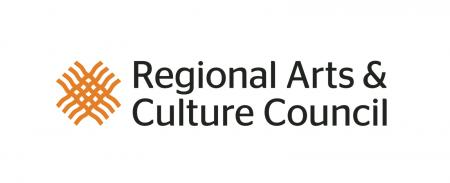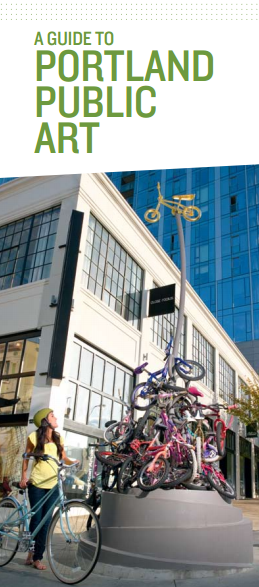Making the Most of RACC
Regional Arts & Culture Council

Most Portland artists have heard of the Regional Arts & Culture Council. But many are intimidated by this bastion of high culture and gatekeeper of grant money. Don’t be, says RACC outreach specialist Tonisha Toler. RACC is much friendlier than artists sometimes realize. The organization has redone its website to clearly show off their many programs. But if you’re confused and overwhelmed, Toler says, “Pick up the phone. We’d rather have someone call us than not want to interact with us at all because of a fear of not being accepted. We’re open to having in-person meetings as well.”
Toler is leading RACC’s efforts to spread local art money, resources and know-how way beyond the Pearl. She wants to reach artists of all ages, incomes, orientations, abilities and disabilities. “We’re talking about equity, inclusion and access,” she says. “We’re trying to make sure that everyone feels they have equal access to programs.” Need a sign language interpreter at a RACC workshop or orientation? Let them know ahead of time and they’ll get one there. Don’t have a computer to fill out RACC applications? You can come in and use theirs.
The Urban Art Network was fortunate to get an earful of Toler’s wisdom about RACC programs, a trend in collaboration and tips to improve your chances of getting a grant funded.
Grants
The annual project grants are one of RACC’s most popular programs. While they accept applications in various disciplines, visual arts is always a large category, Toler says. Individual artists and not-for-profit art organizations based in Multnomah, Washington and Clackamas County are eligible to apply for up to $6,000 in three categories: artistic focus, community participation and arts in schools. Projects have to take place between January and December of the calendar year when the grant is awarded.
For more details about project grants: http://www.racc.org/grants/project-grants
Professional development grants give artists the funds to pursue relevant skills or to take care of business like website building or marketing.
More about professional development grants: http://www.racc.org/grants/professional-development-grants
Workshops
Toler organizes an annual series of workshops. It’s an opportunity to grow your skills and to learn from pros. Upcoming workshops include grantwriting, marketing, bookkeeping and a panel discussion about whether or not your arts organization should apply for 501c3 status. Workshops run for a few hours and cost $30 each. “It’s a really good deal for what people get,” says Toler. The workshops take part in different areas of the city, including some way out in East Portland.
http://racc.org/resources/racc-artists-workshop-series

Public Art Program
Visual artists have a couple of opportunities within RACC’s public art program. And they’re not just talking about giant works of art you see in the street. The Portable Works Collection purchases artwork from visual artists, which it circulates between city and county buildings.
RACC sponsors a dedicated installation space in the Portland Building. “People apply and you do an installation,” Toler says. “All different types of artists go after that opportunity.” Past installations have included a performance artist who set up a bed and had conversations with passers-by and a group who ran a knitting circle in the installation space. RACC sponsors nine installations per year. Six slots are available to professional artists, three are reserved for students.
http://racc.org/public-art/temporary-public-art#Installation
RACC also runs a mural program. If your mural is funded, it becomes part of the city’s public art collection. You can apply anytime.
http://www.racc.org/public-art/mural-program
Orientations
If you’re new to RACC or uneasy about the application process, you can attend a free orientation to some of their programs. In June, RACC holds several project grant orientations. They also host orientations for their public art programs. Toler says to look on the front page of the RACC website to see what’s coming up. Better yet, subscribe to their Art Notes newsletter to stay on top of RACC announcements.
http://racc.org/about/newsletter
Art Spark
Want to rub shoulders with artists? Every other month, RACC hosts Art Spark, a networking event. The next one happens on Thursday, March 20 at the White Owl Social Club. “Come hang out with other artists!” urges Toler.
http://www.portlandartspark.com/

Collaboration
Toler is excited about artists working together. “People are expanding their ideas around collaboration, like who they can collaborate with,” she says. “People are mixing mediums, like a dancer with a painter, a musician with a visual artist.” She’s also seen more creative fundraising efforts and examples of different groups sharing marketing. “For example, a local theater company has an event, they might also announce your event,” she says. “People are sharing resources. Like if you buy a ticket for one event, they’ll make a deal with another one so you get five dollars off. People are realizing it’s not just about getting funding from traditional sources. It’s competitive.”
Grant Tips from Tonisha
Unfortunately, Toler sees artists make the same mistakes in grant writing over and over. Here are a few of the biggies to avoid.
First of all, applicants have a pronounced tendency to ask for the maximum amount of the grant, whether they need it or not for their project. “That is not realistic to us and we can tell every time,” Toler says. “Look at legitimate costs. Don’t inflate your budget.”
With professional development grants, applicants can ask for up to two thousand dollars. “People see that two thousand dollars and they make an opportunity up,” she says. “We read it, we think this feels made up, this feels like they’re having a vacation.”
Name dropping is another no no. “It kind of alienates people,” Toler says. “They make the assumption that just because we’re in the arts we know all these important people, but we don’t.” Tone it down. “Write as if you’re writing to someone who doesn’t work in the arts and has no idea what you’re talking about.”
Grant administrators want specifics. “For example,” says Toler, “someone says, ‘I have a marketing plan. I’m going to send out my portfolio to galleries.’ Send us a list. Let us know that you actually did your research.”
Here’s one excellent piece of information most artists don’t know: “We’ll read drafts of grants if you’re a new applicant and give you feedback,” Toler says. RACC staff members don’t judge the final grant proposals. However, they guide the panels of community judges. That’s a priceless kind of feedback.
Toler is dedicated to spreading the word that RACC is for the people of Portland. “Our mission is to integrate art and culture into all of community life,” she says. This means accessibility for all local artists.
Still unsure? Accessibility means they answer their calls. “All of our departments have that policy,” Toler says. Pick up phone, Portland artists.